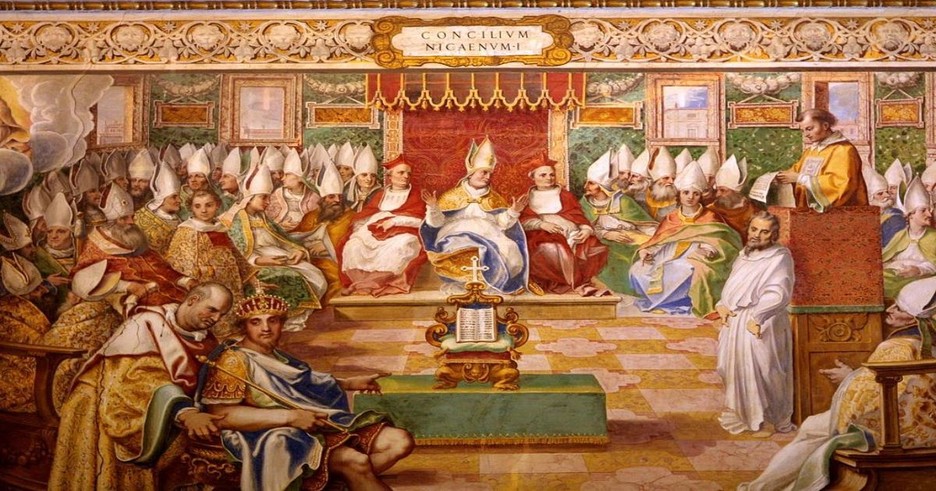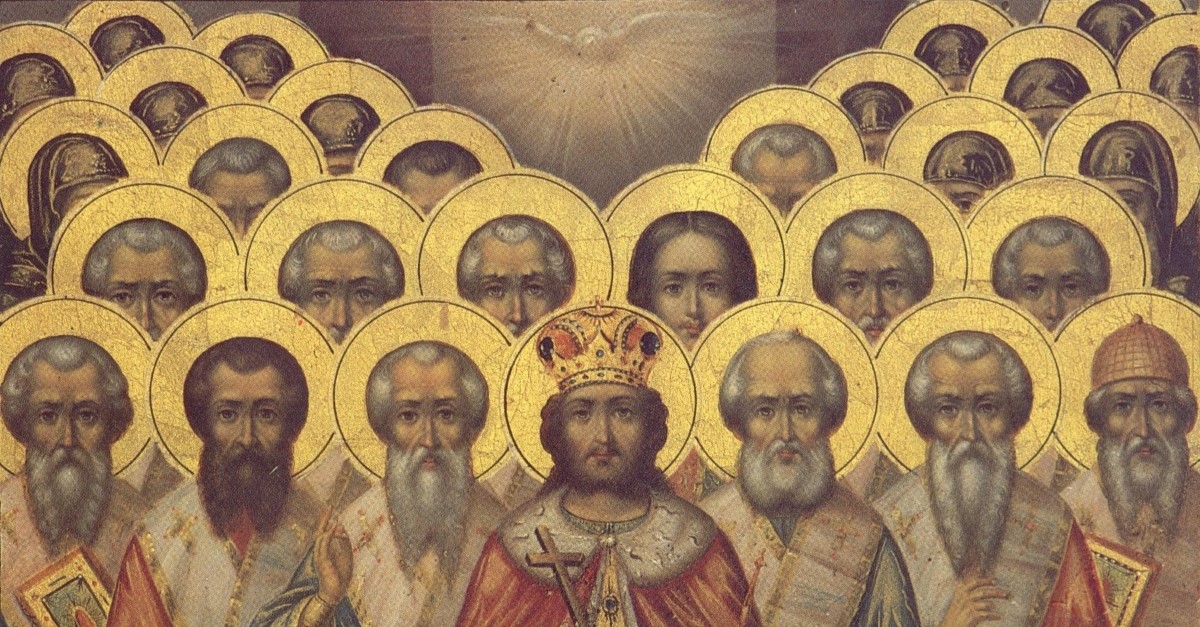
The Council of Nicea
The First Council of Nicaea was the original ecumenical assembly of the Church. The primary intent of the council was to settle disputes emerging from within the Church of Alexandria over the divine nature of Jesus Christ, the Son, in his relationship with God, the Father. Distinctly debated was whether the Son had been 'begotten' by the Father from his own essence and therefore has no beginning, or rather conceived out of nothing, and therefore has a distinguished origin as a separate entity. Historically meaningful as the primary attempt to attain a consensus from a gathering of clerics from all of Christendom, the Council of Nicea was the first occurrence where the specific theological aspects of Jesus were discussed and determined into a creed.
Some of the bishops gathered at the meeting hall looked as if they had barely survived a battlefield. One was missing an eye. Another, also with an eye gouged out, dragged hamstrung legs. Still, another's hands had been scorched. Others wore the scars of scourging beneath their shirts. These victims of torture took their place among hundreds of other bishops. A signal torch was raised. The hall was hushed in anticipation.
The most powerful man in the world, Emperor Constantine, entered, walking on raised heels, his purple gown and silver diadem ablaze with jewels. The first Christian emperor was preparing to address the first ecumenical council.
Even two years earlier, this meeting would have been unthinkable--a gathering of 312 bishops from throughout the Roman Empire, summoned and financed by the Emperor himself. Only a few years before, these same bishops had been branded criminals by Diocletian. Their gouged eyes, burnt flesh, and slashed tendons bore mute witness to the unshakable loyalty they held to the name of Christ. Men in humble garb with twisted bodies waited to hear what their royally garbed and graceful emperor would say.
Constantine spoke. "I rejoice to see you here, yet I should be more pleased to see unity and affection among you." Riots had shattered the peace of the empire-- riots over the doctrine of the nature of Christ. The emperor felt compelled to step in and restore good order. The bishops were expected to resolve their differences and depart in unity.
Arianism Sparks a Fire
Arius, a priest in Alexandria, held that Jesus was a creation of the Father. "There was a time when the Son was not," he and his followers sang, setting their theology to catchy tunes. The first being to be created, Jesus was nonetheless only a creature, according to Arius. He was not eternal. Bishop Alexander of Alexandria had condemned Arius' doctrine, saying that Jesus, the Word, existed eternally with the Father, was divine, and could not be created. Alexander and his aide, Athanasius, believed that by denying Christ's deity, Arianism threatened the core of the Christian faith. Alexander had Arius removed from his post. Arius sought and won support from other bishops of the East. The conflict was on! Rioting ensued. Now, this council had been called at Nicea to settle the controversy.
No Quick Fix in Nicea
If Constantine hoped for a swift resolution to the dispute, he was soon disappointed. When Eusebius of Nicomedia deduced "logically" that the Son of God was a creature, he was interrupted by cries of, "Heresy! Blasphemy!" His speech was snatched from his hands and torn to shreds by bishops who would not allow philosophical arguments to supersede Scripture. Men who had suffered for Christ were not about to sit tamely and hear him blasphemed.
From then on the two sides argued fiercely. Finally, someone suggested a way to break the impasse: write a creed to which all should subscribe. Six weeks later, several days before the council ended, the statement had been hammered out.
The creed affirmed that Jesus was "from the substance of the Father, God from God, Light from Light, very God from very God, begotten not made, of the same substance as the Father..." Constantine himself suggested the keyword of the creed, homoousius, meaning "of the same substance." Arius preferred the word homoiousius, meaning "of similar substance." All but three bishops signed the creed. Arius and the others who refused to sign were banished.
In the closing hours of the conference, Constantine, moved by the heroism of those who had suffered for Christ under his pagan predecessors, is said to have caressed their wounds and kissed their empty eye sockets. Their scars bore strong witness that the Nicene Creed was sound.
Creed of Nicea Ignored By Imperial Rule
It seemed the issue was settled. But political winds changed. Constantine drifted toward Arianism and sided with the heretics. For two centuries, whoever held imperial power decided the fortunes of the theological factions.
Athanasius, for example, the leader of those who argued for Christ's deity, was exiled five times for his views. This did not alter his staunch support of the creed. He realized the gap between fallen human nature and a holy God. Only God could bridge it. If Christ were fully God and fully man, he could be that bridge but not otherwise. He had to be a man to represent us; he had to be God to overcome the infinite gap.
The Precedent of Nicea
The council of Nicea was important for many reasons. It established a precedent. Six other ecumenical councils would follow (see the box below). Each, like Nicea, tried to settle some thorny church problem by putting difficult questions to the collective wisdom of its bishops. If political pressure was brought to bear at the first Nicene council and fair play sometimes suffered, at later councils these tendencies were aggravated. Finally, despite the power struggle at Nicea and political battles in the years following, the creed of Nicea, with its clear assertion of the deity of Christ, remains fundamental to the Church to this day.
Fascinating Facts. . .
- The Arian view that Jesus was created is taught by Jehovah's Witnesses today.
- Only those councils are called ecumenical which were "worldwide" councils, that is, councils which embraced both the Eastern and Western halves of the Roman Empire.
- On the first day of the Council of Nicea, Emperor Constantine would not immediately seat himself on the carved wooden throne erected for him. Out of respect for those bishops who had been tortured, he stood silently before it until the bishops compelled him to sit.
- Constantine had the Council meet at Nicea because of "the excellent temperature of the air, and in order that I might be present as a spectator and participator."
- The Council opened in June of 325. In the center of the meeting hall on a seat or throne were the four Gospels.
- Three accounts survive reporting on the council, the most lengthy by ancient church historian Eusebius.
In Their Own Words... From the CREED of NICEA
"We believe in one God, the Father almighty, maker of all things visible and invisible. And we believe in one Lord Jesus Christ, the Son of God, begotten from the Father, only begotten, that is from the Father's substance, light from light, true God from true God, begotten not made, of one substance with the Father. Through him were made all things, both in heaven and on earth. For us and for our salvation he came down, was incarnate and became human. He suffered, rose again on the third day, ascended into the heavens and is coming to judge the living and the dead. And we believe in the Holy Spirit. But those who say, 'there was once when he was not' and 'before he was begotten he was not,' and that 'he was made out of nothing,' or who affirm that 'the Son is of a different hypostasis or substance,' or that he is mutable or changeable - these the catholic and apostolic church anathematizes."
NOTE: This creed is not to be confused with what is now known as the Nicene Creed.
("Is Jesus God? Asked the Council of Nicea" first published on Christianity.com on April 28, 2010)

Was the Council of Nicaea the First Time that the Church Declared that Jesus Was God?
Did a belief in Jesus’ divinity receive its decisive sanction through a “close vote” at Nicea in AD 325? What we know about Nicea is this: It gathered not to determine the divinity of Jesus but to discuss the Arian view of Jesus, who saw Jesus as Son of God, but appointed to that role versus the view that the council adopted that Jesus possessed Sonship from eternity. So the debate was the type of Son of God Jesus was, not whether Jesus was divine. Arius believed that Jesus was Son as the first created being with a special, unique relationship to God. What Nicea ended up affirming is that Jesus was eternally the Son and was not created.
Constantine did call this council together because he wanted peace and unity in the church. The council had from 216 to 316 bishops from around most of Christendom in attendance, but the vast majority were from the East. There was no close vote. What the bishops did was sign a creedal statement known as the Nicean Creed. Only two out of the entire group refused, so the “vote” was hardly close. Most politicians today would view a 214-2 to 314-2 vote as a landslide (a ninety-nine percent plus majority!).
Now, there was pressure to accept this confession at the council, as originally seventeen opposed it. When Constantine threatened exile, that number reduced to 2. However, even if we take seventeen as the number originally opposed, this is still a significant minority of less than ten percent of the total in attendance.
This claim of a late developing view of deity also ignores the fact that the acceptance of the divinity of Jesus is something fundamental to the earliest documents we have from Christianity. This appeal is a matter of historical record about our earliest available sources. One can look at the writing of Paul (1 Corinthians 8:5-6; Philippians 2:9-11), the unknown author of Hebrews (Hebrews 1:3), the author of Revelation (Revelation 1:1-7 and Revelation 1:4-5), the gospel of John (John 1:1-18), or even Jesus’ own testimony at his Jewish examination (Mark 14:62-65 and parallels) to see that the claim was that Jesus was at the side of God in a position of status equal to His, receiving worship as He does. These works all date anywhere from the sixties to the nineties of the first century. One can add to this the testimony of Pliny the Younger, writing as a Roman Governor of Bythnia, far away from Jerusalem. He writes to the Roman Emperor Trajan in around AD 117 speaking of Christians singing hymns to Jesus as a god. So even non-Christian texts corroborate the views we see in the earliest Christian texts that Jesus was worshipped long before Nicea. The belief in Jesus as divine was a core belief of the earliest church. Paul’s testimony and conversion tells us that this was believed in the thirties of the first century, as the letter to the Galatians indicates. Jesus’ divinity was not the result of a close decision in the fourth century. Its roots go back to Jesus himself, which is what explains why the church, originally made up of Jews, held to this new view on the doctrine of God.
Taken from "De-Coding the DaVinci Code: Seizing the Mars Hill Moments" by Discover the Book Ministries.
("Did the Council of Nicea Vote Christ as God?" by John Barnett on April 28, 2010)
Cover Photo Credit: "Council of Nicaea 325" Fresco by Giovanni Guerra via Wikimedia Commons.



